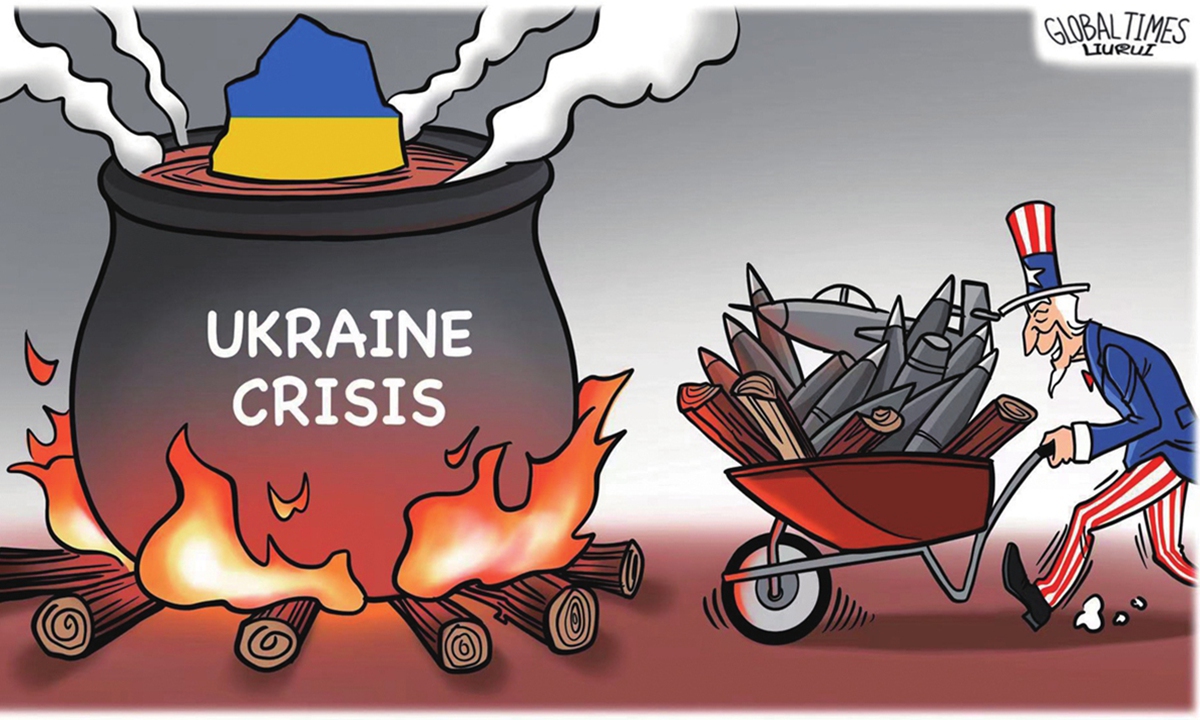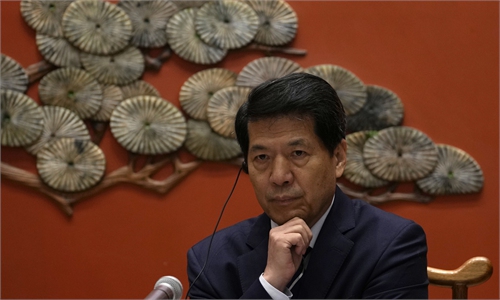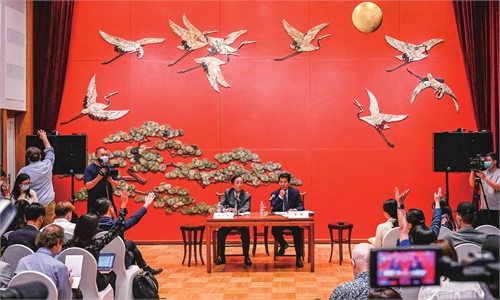Ukraine crisis 'may escalate' amid new aid deal
China the only major country that remains neutral, makes mediation efforts: expert

US Ukraine crisis Illustration: Liu Rui/GT
There are new dangers of an escalation in the Ukraine crisis as media claimed that NATO members are mulling deploying ground troops to join the war and the West continues to send weapons to fan the flames of the conflict. Consequently, Russia warned that it is ready for nuclear war if the US sends troops to Ukraine, while China has concluded its second round of shuttle diplomacy among key players in Europe on seeking a political settlement to the Ukraine crisis.
Chinese experts said the current situation showed that the US and other Western countries are aiming at preventing Ukraine from being overwhelmed by Russia's offensive. However, after two years of conflict, it is increasingly showing that the West is becoming fatigued and weaker in its capabilities amid a prolonged conflict. Their primary goal is just to strengthen Ukraine's defense capabilities to ensure Kiev stays fighting in the battlefield.
At this stage, China's role as a mediator is important to help relevant countries to avoid miscalculation and reduce the risk of escalation, they pointed out.
EU countries are set to agree a new 5 billion euro top-up to a fund used to finance military shipments to Ukraine, as the US managed to scrape together $300 million more in ammunition and artillery for Kiev, the Financial Times (FT) reported on Wednesday.
The EU deal, which needs formal approval at a meeting of member states on Wednesday, unlocks fresh cash for the reimbursement of arms supplies to Kiev by countries in the bloc as a $60 billion package is being held up by US Congress at a critical time for Ukraine's war effort against Russia.
The stop-gap assistance from the Pentagon, announced on Tuesday, as well as the agreement in Brussels indicates Western policymakers' growing fears about Kiev's forces no longer being able to hold the line against Russian troops, the FT reported.
The EU is aware that Ukraine's military morale and weapon reserves are currently insufficient to withstand a potential Russian offensive, and this is why NATO members are reportedly considering sending troops to Ukraine to prevent a direct attack from Russian forces on Kiev or the seizure of Odessa, as this would demolish the efforts of the US and EU has made in Ukraine, said Cui Heng, a scholar from the Shanghai-based China National Institute for SCO International Exchange and Judicial Cooperation.
Besides, some NATO members are now talking about sending their forces to fight in Ukraine,
according to some media reports.
Russian President Vladimir Putin warned the West on Wednesday during an interview with Rossiya-1 television and news agency RIA that Russia was technically ready for nuclear war and that if the US sends troops to Ukraine, it would be considered a significant escalation of the conflict.
"From a military-technical point of view, we are, of course, ready," Putin said to Russian media in response to a question about whether the country was really ready for a nuclear war. The Russian president said the US understood that if it deployed American troops on Russian territory - or to Ukraine - Russia would treat the move as an intervention.
On Monday, Special Representative of the Chinese Government on Eurasian Affairs Li Hui held talks with Deputy Director General for Political Affairs and Security of the Ministry for Europe and Foreign Affairs of France Jonathan Lacote in Paris, and they had an extensive exchange of views on China-France relations, the Ukraine crisis, as well as other topics of mutual interest and concern, the Chinese Foreign Ministry released on Wednesday.
Li Hui briefed on the current round of shuttle diplomacy, saying that the most urgent task now is to cool down the situation and find a way for a cease-fire and an end to the fighting as soon as possible. This year marks the 60th anniversary of the establishment of diplomatic relations between China and France. As independent major countries with global influence, the two countries should strengthen dialogue and cooperation, and work together to shape a peaceful, stable, equal and orderly multipolar world. China is ready to continue to maintain close communication with France on the Ukraine crisis.
Lacote said he appreciated China's efforts in mediating the Ukraine crisis, and thanked Li for his briefing on the current round of shuttle diplomacy. He said that the Ukraine crisis has brought an impact on the security of Europe and the international order, and that France and China, as permanent members of the United Nations Security Council, have greater responsibility and obligations to jointly promote the proper resolution of the crisis. The French side is ready to continue to maintain communication with the Chinese side at all levels in this regard.
Cui told the Global Times on Wednesday that China is the only major power and permanent member of the UN Security Council that remains neutral and is making mediation efforts in this conflict, and its shuttle diplomacy is important to find common ground among different parties by engaging with them separately.
"Now the situation shows that the conflict is likely to escalate, so even if China can't bring everyone to the table immediately, it can at least contribute to the reduction of the risks of miscalculation and avoid escalations among the conflicting parties," Cui noted.
The tension is getting stronger among Russia and Ukraine and the EU, so now is precisely the time China and the international community should work together to form a united front, Cui Hongjian, a professor with the Academy of Regional and Global Governance at Beijing Foreign Studies University, told the Global Times, hoping this kind of force will deescalate the current tense situation, creating a balance and restraint effect.
Asked about what conditions should be reached for a negotiation, Cui said that both sides need to compromise on their current goals because only in this way can a political foundation for negotiations that both sides can accept be reached.




